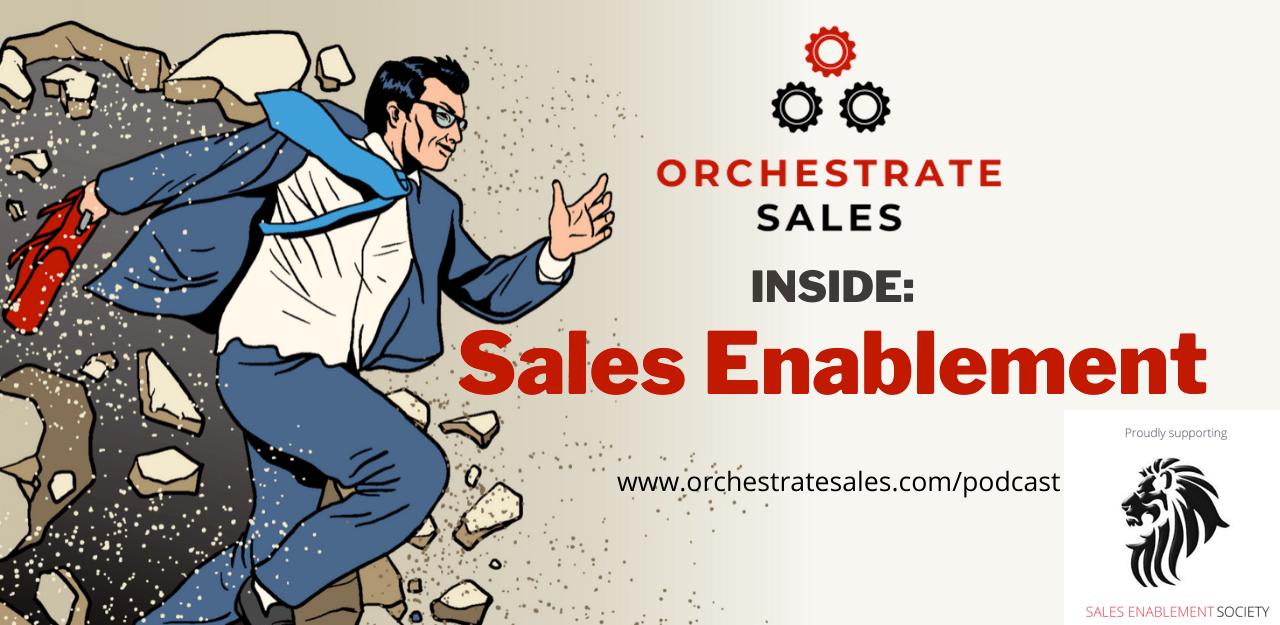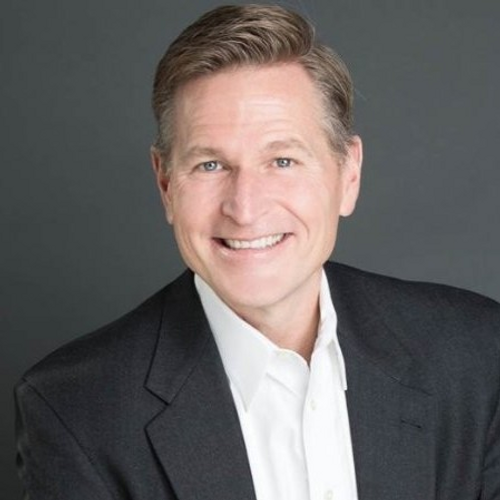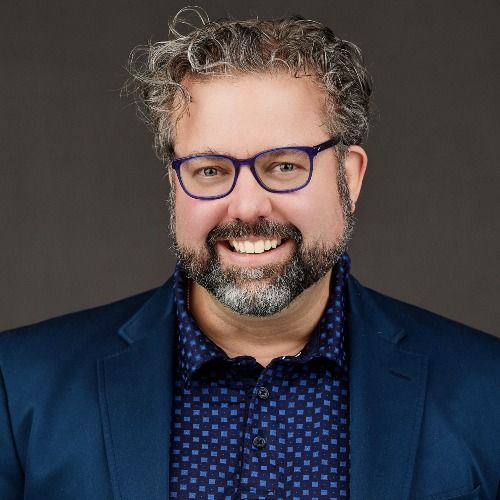Ep51 A Sales Leader’s View of Selling Business Outcomes with Bob Apollo
Welcome to the Inside: Sales Enablement Podcast Episode 51
Our focus on this podcast is for you sales enablement leaders and orchestrators. As an orchestrator. You need to develop skills to be mission and goal focused. prioritize the right goals and the right moments, guide the narrative by confronting reality, drive results by design, not effort and unlock energy to create momentum. To do that, today, we've got a special guest is going to join us to talk about a very important topic, and that is selling outcomes.
If you're a devout listener, and insider nation member, you will already know this illustrious guest. He was in our panel or on our sales leader COVID panel. And I'm delighted to have Bob Apollo just himself. So if you don't know about Bob, one of the things that he's doing that's really exciting, is he's launched an outcome centric Academy.
EPISODE TRANSCRIPT:
Intro 00:02
Welcome to the inside sales enablement podcast. Where has the profession been? Where is it now? And where is it heading? What does it mean to you, your company, other functions? The market? Find out here. Join the founding father of the sales enablement profession Scott Santucci and Trailblazer Brian Lambert, as they take you behind the scenes of the birth of an industry, the inside sales enablement podcast starts now.
Brian Lambert 00:34
I'm Scott Santucci, Brian Lambert and we are the sales enablement insiders. Our podcast is for sales enablement leaders looking to elevate their function, expand their sphere of influence, and increase the span of control within their companies.
Scott Santucci 00:49
Together, Brian and I've worked on over 100 different kinds of sales enablement initiatives as analysts, consultants or practitioners. We've learned the hard way, what works and maybe What's more important, what doesn't?
Brian Lambert 01:02
Our focus on this podcast is for you sales enablement leaders and orchestrators. As an orchestrator. You need to develop skills to be mission and goal focused. prioritize the right goals and the right moments, guide the narrative by confronting reality, drive results by design, not effort and unlock energy to create momentum. To do that, today, we've got a special guest is going to join us to talk about a very important topic, and that is selling outcomes. Scott, can you introduce our guests?
Scott Santucci 01:31
Absolutely. So if you're a devout listener, and insider nation member, you will already know this illustrious guest. He was in our panel or on our sales leader COVID panel. And I'm delighted to have Bob Apollo just himself. So if you don't know about Bob, one of the things that he's doing that's really exciting, is he's launched an outcome centric Academy. So before I get into more details about that, let's Bob Tell us a little bit about yourself in specific What is this outcome centric Academy in first place?
Bob Apollo 02:06
Yeah, thanks, Scott, and really happy to be back with the program again. So my career really has been one of spanning sales and marketing for a variety of organizations over the years. But most recently, I've been spending my time working with, I suppose what you're characterized as scale up b2b tech based businesses, for whom sales enablement, sales effectiveness, and all of the things that go with that absolutely essential foundations for building a growing business and delivering predictable outcomes.
Scott Santucci 02:46
Awesome. So what we're going to do here is one of the things that we're doing on our show is we're trying to create more opportunities to learn. And as you've been, as you know, we've had several webinars that are all predicated on post COVID research. And the last webinar that we did is was around routes to value enable customers, enabling customers to buy. So what we're going to do is just like we did with Joe Hayes, is we're going to get a sales leaders perspective on it. And then I expect we're going to spend a lot of time Bob talking about outcomes and what exactly they mean. So what we're first going to do is ask Bob to highlight for him, what are three things that most resonated with him about what we shared, and then we're going to get into a conversation there of who knows where we're going to go with Bob and his rapier wit. And then what we're going to do is we're going to wrap up with Brian putting together what what he heard and what's important for you as a sales enablement orchestrator. So Bob, what are what are three things that you got from the from the webinar?
Bob Apollo 03:53
What you know, the first one is, you've given a name to a date Disease the organization's have been suffering from for years.
And you call it proper eye test. And it's from my observation.
It's the sort of a reflection of an inside out perspective on the part of typically technology companies, but not exclusively, who are obsessed about, you know, the products they create the features that they've developed, you know, competitive knockoffs and so on. And all the while they're thinking about that, they're not thinking about what the customer is actually trying to achieve, or why the customer might be motivated to buy anything, let alone their product in the first place. So that's the sort of first thing you've named something that I suspect people will recognize that they've been suffering from, whether it's sales enablement people, whether it's sales People, other members of the organization, you know, I think we've all been blighted by product itis in our time.
Scott Santucci 05:08
ie blighted. That's a great word, what I think would be really fun. So if you haven't watched the webinar, you can go to inside sales enablement comm and download it and watch it. But I think will be really fun. And thinking you think hearing your response to it, I think it'd be really, really fun to walk through and go through the product, outcome view back and forth, sort of like a he said, she said with you. So what was your second second takeaway?
Bob Apollo 05:36
Well, the second one, which again resonates very much with my perspective on how people make buying decisions, is customers start on a path towards change because they've got issues. And the best thing that a salesperson could do in their early engagement with a customer is to really ask Cover and develop those issues and their implications. And, you know, we're back to what's the role that sales enablement can play in that. It's equipping the salespeople to have those issue lead conversations. And don't just stop when you've uncovered an issue and then revert to type and pitch your product, stick with the problems, stick with the issues stick with the reason to change and really explore the implications with the customer of what would happen if they just carried on their current path. So that was the second thing, you know, highlighting. I think you sort of quoted in the maybe a couple of places in that webinar, why, why and how our customers so value, a conversation about it business issues, rather than product features.
Scott Santucci 06:54
So what's interesting about that, and if you're if you're joining, there were lots of quotes They were dense quotes, and they were hard to read properly during the webinar. And I even got some feedback they shouldn't read rate them out. But the reason that I put a lot in there is that I want people to have them on their decks. Yeah, and quote them a lot because nothing helps bring to life these problems than hearing the voices of executive level buyers of what's not happening. And it's it's a ubiquitous problem. And I think we have to all do a much better job. sales enablement. People talk about buyers journey and being but buyer centered and you know, cut buying enablement we're talking about. We've been hearing a lot of these things for a long time, but we're not really addressing the challenges. So bringing these quotes to bear I think, I think help a lot. And I
Bob Apollo 07:49
think sometimes we can think that content by itself will sell but, but really, I think the purpose of content is to stimulate conversation. Yes. And you know, it's In those conversations, those one to one or small group conversations between the salesperson and the representatives of the customer, where the real traction happens.
Scott Santucci 08:10
And I think that's a, that's a great point. Because one of the things that's been very fascinating, and this is why we're trying to do this on our show, is I learn as much if not more from the feedback after these, these webinars, and we don't have a way to share it. And bataya the whole idea, the whole section that we had in there about mapping out the customers and the agreement network and everything like that resonates so strongly with sales leaders. It's unbelievable how much it resonates because they know in their heart of heart, I'm sparking a conversation so I can co create value with my customer. What's interesting, though, Bob is the people who work in the rest of the company. They tend to not see that because they want the salesperson to prescribe the product that they have, instead of the CO create whatever the outcome is,
Bob Apollo 09:08
yeah, even heaven forbid, they want the salesperson to para word for word, their company presentation not realizing that they're not just presenting into the ether. They're presenting to one or a number of people. And if that presentation doesn't stimulate a conversation that might go off piste because you learn something about the customer and you react to it. I mean, that whole idea of prescribing, coaching training people to give Word Perfect presentations almost always reinforces product itis.
Scott Santucci 09:47
That's right, inevitably. What's fascinating about that is these are things that if you talk with people who have a lot of sales experience, you're like, Well, duh, of course that's what you have to do. And then it's like, well, I'm not learning anything new. But the issue isn't about you. The issue is how do you get the rest of the organization to get aligned behind you? And that's challenged. And you have to recognize that not everybody has the same degree of client empathy that maybe you have, and maybe not all of your salespeople have, which I think gets us into what's your third takeaway?
Bob Apollo 10:26
Well, that might well be your illumination of the power of outcomes as part of successfully engaging with the customer. You know, we need to avoid product itis. We need to equip and coach our salespeople to have really powerful conversations about issues and bring insights to bear against those issues. And the third element is so I don't think a customer starts a buying process, at least in a complex search. Well, you know, it's a discretionary purchase, they won't initiate the buying process seriously, unless there's something that looks like an issue that needs to be dealt with. And I'd also suggest they won't conclude the buying process, unless they're confident in the outcomes, that the change that's being proposed to them is going to deliver.
Scott Santucci 11:21
Yeah. And I think that's so well stated. And I think what, what I'm very curious to get your feedback, so we haven't had a chance to rehearse this, that. So one of the things that we've created is an outcome wheel. And the reason that we create that outcome wheel is to provide a checklist of all the things that an executive is probably going to ask in their head, before they're willing to move forward with something. And we want to we tend to think about step one, I do this step two, I do this step two, three, I do this, but that's not the reality of human beings. We tend to operate holistically. So the outcome wheel has a, you know, a couple parts starting with what's the achieved end state. But I think some people start with that's all an outcome is. So I guess what I want to do is have a conversation with you, Bob about what actually is an outcome?
Bob Apollo 12:16
Okay. Well, you know, I think actually outcomes apply to a number of phases in the relationship between a salesperson and a prospective customer. That is an ultimate outcome, which is really what the customer seeks to achieve as a result of engaging in a change program. But I think we also have incremental outcomes, which are things which demonstrate progress towards achieving that ultimate goal and to the point you make with your wheel, some of those outcomes tap into strategic perspectives, some into operational perspective. Some into a variety of other perspectives, and you've identified half a dozen in that in that wheel. And again, this is really part of the art of conversation as to how we set up an engage conversation with the customer around these different manifestations of outcome and how we seek to move forward progressively with the customer. With many or incremental outcomes or advances however you choose to characterize them, that when they are strung together, result in the customer achieving what they need to and, and, and contrasting that with the situation they're in at the moment. And I'll make a brief reference about the importance of contrast. Because I think if there's only a narrow a perceived narrow difference between the current trajectory the customer is following and the difference An outcome they might achieve. If they accepted your change programming proposal. If there's a narrow gap, it's not unlikely that they'll stick with what they've got right there isn't sufficient meeting it. So we need to be creating a stretching a perceived gap between where they're heading today, and where they could actually get to. If we work with them, help them collaborate with them, deliver capabilities, help them adopt an approach that maximizes their chances of getting that desired outcome.
Scott Santucci 14:37
That's spot on and I what I want to do is, I want to unpack what we're talking about here for our listeners. Everything that Bob's talking about, are very specific details that you have to do on a one to one basis. The reason that we created the outcome wheel however, is that you can't prescribe For Bob, it was a let's take the role that I'm the sales enablement person, I'm enabling Bob, there's no way I can prescribe for Bob, what's going to happen because Bob can't prescribe what's going to happen with the customer because the customer is going to have their own conversation. So we have to equip Bob has to be trained and knowledgeable enough to know what value is, how to handle it, etc. And I have to be able to organize content here. So let's talk about what that outcome wheel is and what its elements are. element number one is to be able to paint or what's an achieved in state. So what I have to do is I have to be able to say, hey, Bob, here are some end results of where customer where we've helped customers be successful with other this identity. And Bob needs to understand it well enough to where he can present that in front of a customer and make it their own
Bob Apollo 15:54
because it has to be their own. And just to an observation on that. Again, thinking about how we equip salespeople To accomplish this, the power of anecdote and story exactly conveying that vision is if I struggled to think you can properly articulate an outcome without having some ability, custom stories, experiences, anecdotes, and so on.
Scott Santucci 16:22
That is so well stated. And really what we have to do is we have to blend, Bob has to have the skill of telling a story. And I have to give them the script more or less, I don't mean script, like, I need to give them the outline of the telling the story. Right. So there's the both of those parts. The second thing, the second attribute is framed through the lens of an executive owner. There's somebody who's going to who's going to get fired if that outcome doesn't achieve or is going to get promoted, if that achieved and we have to message it to that person. Speaking in the abstract doesn't work. Speaking minion level work doesn't work. It has to be in The language of that targeted stakeholder.
Unknown Speaker 17:02
Right?
Scott Santucci 17:04
And so you can imagine how much training goes into learning how to speak that language. But also we have to make sure if we're preparing content that we've done the homework that we've interviewed, enough CIOs, if we're trying to talk to CIOs are enough CFOs. And we've role played out that content because writing stuff down and talking to stuff is very, very different. And we want Bob talking with them, because we want them having conversations.
Bob Apollo 17:31
And just to the point of the executive stakeholders, I think we also need to judge because sometimes it can be a bit deceptive content. People can carry titles, but not necessarily either the authority or the desire for change, that we've got to make an assessment whether the person we're depending on not to champion our solution, but to champion the project. That's really distinction is somebody who's a change agent and respected change agent. within their organization is somebody who understands how to get things done.
Scott Santucci 18:07
That's right, and what So basically, what I would need to do is I would need to go and find other change agents in our customer base, come up with some sort of criteria to inform Bob of what that criteria is. But Bob has to know, to determine whether that person that he's talking to is, so Bob has to have the skill, but if I'm not providing him the things to look for, based on research, or based on what we're doing, we're putting all the burden on Bob, and that's not fair. How can Bob know how many people have Bob has Bob worried about or talk to,
Bob Apollo 18:43
to bring this back to the sales enablement agenda? You know, there'll be a handful of salespeople in any organization who are just naturally gifted at this and they might actually be the source for some of the insights we want to share with their peers. But the greatest impact on absolutely convinced this is by elevating otherwise, you know, good enough core competence salespeople to be that much more polished and effective.
In in having these conversations.
Scott Santucci 19:12
Yes, yes. And the Polish matters a lot. So that's why we want to have good training that's in sync. It also has to have the right structure as well. So the third, the third attribute is framed as an initiative. And what does that mean? executives fund initiatives. They don't fund your products. There is nobody out there who's going to say we're going to do project by product from you. That doesn't have it's not how it works. They come up with an initiative. They give it some sort of internal identity. They know where they're going, and they're after their business result, not your software or...




